Zhukula-- A place where coffee pilgrims must visit once in their lives.
For professional baristas, please follow the coffee workshop (Wechat official account cafe_style)
Zhu Kula, the birthplace of coffee in China, is a place that coffee enthusiasts must visit once in a lifetime.
There are 1134 old coffee trees and 24 old coffee trees.
On June 16, the big names of the global coffee industry gathered in Zhu Kula.
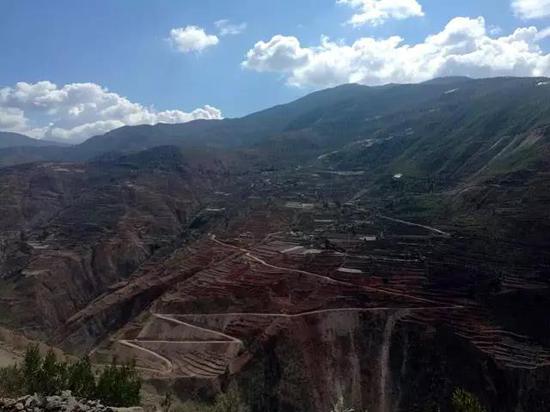
The forum was held in the old church of Zhukula village in 131. in the old building, drinking Zhukula coffee and simultaneous interpretation, there was a multi-lingual coffee professional exchange. This once tranquil Yi coffee village glowed with unparalleled charm on this day.
The coffee history of one hundred years collides with the most avant-garde coffee thought in modern times.
Drink a cup of Zhukula coffee, soft, mellow, after drinking the traditional way, the coffee grounds fall on the bottom of the cup, this is the century-old pilgrimage ceremony of this kind of Zhukula coffee.
Let's go into the Jukula Coffee together.
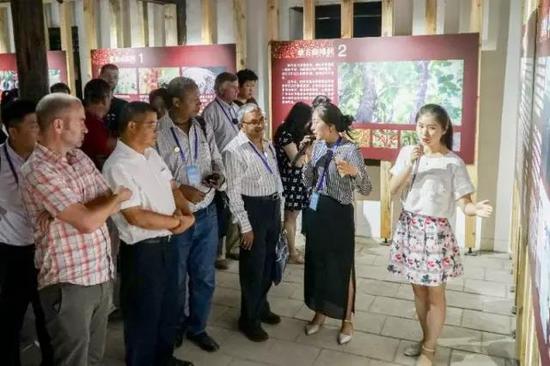
Zhu Kula Coffee Culture Museum
Historical review
French (Alfred Lietard) Catholic Father Tian Deneng (Chinese name) was sent to Yunnan, China by the Foreign Mission in Paris on July 29, 1896. In 1904 (the 30th year of Guang Xu of the Qing Dynasty), he entered Binchuan to preach, and because of his missionary and coffee-drinking habits, his colleagues brought coffee seedlings from the Dali diocese from Buon Ma Thuot in central Vietnam via the Yunnan-Vietnam Railway. It has been 113 years since Father Tian Deneng sent it to plant under the back wall of the Catholic church in Zhukula village in the same year. It is the most vivid and classic epitome of agricultural production following the slash-and-burn cultivation of the ancient Yi people in modern times. The ancient coffee forest in Zhukula Village is the only agricultural form that has been introduced and passed on in situ for more than one hundred years in the most barren areas of the dry-hot valley in China and even in the world. it is the most fresh and complete example of the coffee industry in the world and has high scientific research value.
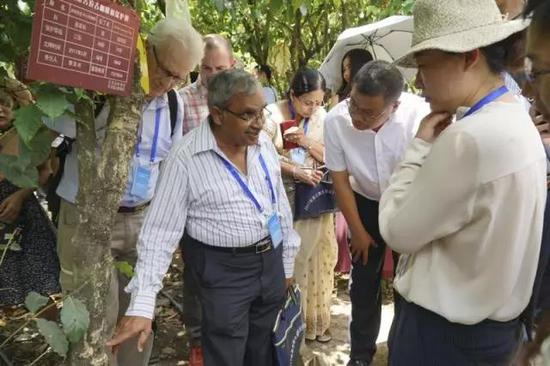
Century-old coffee tree, coffee experts from all over the world discuss coffee on the spot.
In 1948, Li Fusheng, the head of the old village, consulted with the Catholic missionary Duan Guozhang on the motion to expand coffee cultivation, and finally realized Zhu Kula's first upsurge of large-scale coffee cultivation in the whole village. In that year, bandits were rampant on both sides of the Yupu River. Zhang Hongbin, a big landlord along the bank of Jiangxi Province, occupied all the land along the river, and the common people had to pay rent and taxes to him for farming and grazing, thus bringing some trouble and hindrance to the first upsurge of seed expansion.
In 2010, the old village head Li Fusheng recalled and said: "in 1948, I started 43 families in the village to plant more than 80 mu of coffee, but later, due to a heavy snow in 1984 (author's note: December 26-27, 1983), I froze to death and preserved only 13 mu of coffee."
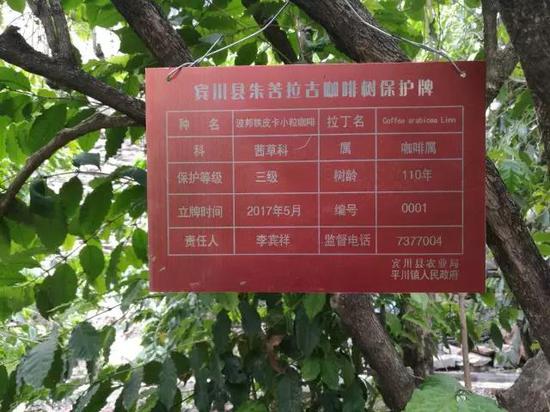
Results of the forum
In order to effectively enhance the brand effect of Zhukula coffee culture, prosper the local economy, promote social stability and national unity, the county party committee and government of Binchuan County decided to entrust Yunnan Fine Coffee Society to hold the first 2017 Binchuan Zhukula Coffee Forum in Dali, Yunnan Province, during the 2017 Binchuan Grape Culture and Tourism Festival in Dali (hereinafter referred to as Zhukula Coffee Forum).
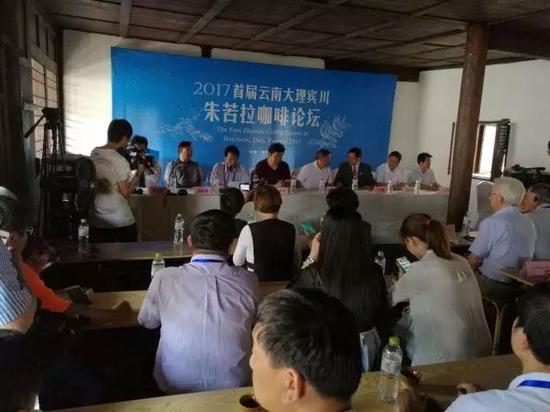
As of June 12, 2017, the Forum Group Committee has received a total of 60 domestic and foreign experts and guests who have been invited to attend, including 12 from the international, Taiwan and Macao regions (9 foreign experts from the United States, France, India and Ethiopia), 2 Taiwan experts and 1 Macao expert. There are more than 30 leaders and responsible persons of various departments of the provincial, prefectural and county governments, and more than 100 villagers of Zhu Kula, a total of nearly 200 people participated in a series of forum activities. Zhu Kula Coffee Forum received a total of 43 papers, including 6 in English. Finally, there are 30 articles in the collection of papers aimed at Zhu Kula Coffee. Zhu Kula
The main contents of the Coffee Forum are: (1) inheriting and protecting Zhu Kula coffee forest and coffee culture and non-material culture for more than 100 years; (2) scientifically developing the cultural brand of Zhu Kula coffee to enrich Yi farmers in mountainous areas. The specific activities include: (1) holding the "first Zhukula Coffee Forum" in the Life complex of the Centennial Zhukula Catholic Church; (2) visiting the Zhukulagu Coffee Forest; (3) "Zhukula Coffee Dream Manor" holding Zhu Kula coffee cup testing and appreciation sharing; (4) holding the opening ceremony of the "World Coffee Celebrity Garden" and planting coffee commemorative trees at the same time.

A full-bodied cup of Zhukula coffee
Discovery and inheritance
In 1981, the late Professor Ma Xijin, a famous hot work expert in our province, went to Zhukula village to make a textual research on the 13 mu ancient coffee forest and concluded that Zhukula coffee belongs to the oldest and purest Bobang Tetsuka variety of Yunnan small grain coffee. In terms of species, it is a group of iron pickup varieties (31% of red top plants) and 69% of Bobang varieties (69% of green top plants). Although the coffee tree has been a hundred years old, it not only has not seen its old state, but also can grow normally and blossom and bear fruit year after year. It has been proved to be the oldest coffee tree in China. This variety is very rare in our country, and its quality is very excellent. It has extremely high historical and cultural relic protection price m value and scientific research value.
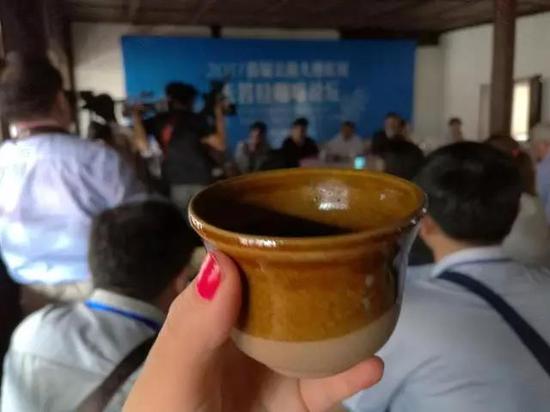
On July 27, 2008, Dehong Hongtian Industrial Group Hougu Coffee Co., Ltd. pioneered and organized journalists from more than a dozen central provinces and cities to make a surprise visit to Zhu Kulagu Coffee Forest. In the same year, a large-scale press conference was held. After that, "more than a thousand pieces of news, newsletters and special features about Hougu Coffee" appeared in the world and announced to the outside world. Zhu Kula's existing 13 mu coffee is the oldest coffee in China. There are 1134 coffee trees coexisting in 13 mu coffee forest, of which 24 are over 100 years old and 1100 are over 60 years old. Since 2008, a number of experts and independent scholars of coffee literature and history in China's scientific research institutes have gone to Zhukula Village for many times to carry out textual research on this 13 mu ancient coffee forest.
In 2010, Wu Hongping, a Zhejiang businessman who had lived abroad for 33 years, came to Zhu Kula village and decided to invest in the development of Zhu Kula coffee. In that year, he registered "Binchuan Plateau Organic Agriculture Development Co., Ltd." (the company was later controlled by Beijing entrepreneur Wan Xuejun). The company established the first coffee planting base in Laohaitian Village, Jinniu Town, Binchuan County, which is suitable for planting, planting more than 1000 mu of coffee. In 2011, Binchuan County Zhongying Township Leather Factory Village Committee contracted more than 25000 mu of barren mountains, established a second coffee base, and applied for registration of the two coffee trademarks of "Binchuan Coffee" and "Ludilla Coffee".
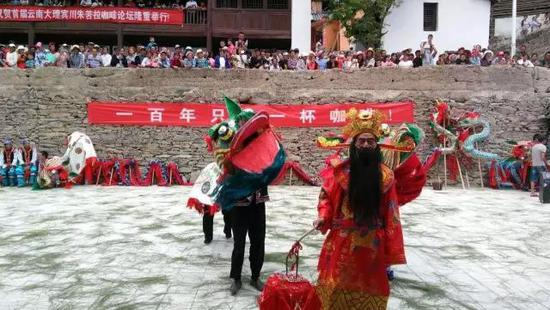
According to the opinions of Yunnan Provincial people's Government on speeding up the Development of Coffee Industry and the Development Plan of Yunnan Coffee Industry (2010-2020), Binchuan County Party Committee and County people's Government attach great importance to and strengthen measures. From the organization and leadership, policy support, financial support, investment attraction, brand building, publicity and other aspects, we should earnestly do a good job in the protection of Zhukulagu coffee forest and the cultivation and development of coffee culture industry in the whole county. In 2013, "Binchuan Zhukula Coffee" was successfully registered as the "Chinese Geographic indication Certification Trademark". Zhukula Coffee has not only become a resounding brand in Binchuan, the rise of Zhukula Coffee Culture Tourism will become an efficient and long-term rural characteristic industry to improve and improve the ecological environment and increase the income of the people in the dry and hot valley.
The village of Zhukula has been growing coffee since 1904, and the village has been surrounded by coffee trees ever since. Coffee has been grown in the villages next to Zhukula village and in the Zhukula valley areas such as Dayao Tiesuo Township, Chuxiong Yi Autonomous Prefecture, on the other side. In 1997, the old coffee tree planted by Father Tian Deneng died unfortunately. It is worth mentioning that the slash-and-fire mode of agricultural production adopted by the Yi people was the ancient coffee forest in Zhukula village that was preserved and passed down. There are 1134 ancient coffee trees in 13 mu, which still witnessed the planting history of Zhukula coffee for more than 100 years.
Coffee intangible cultural heritage
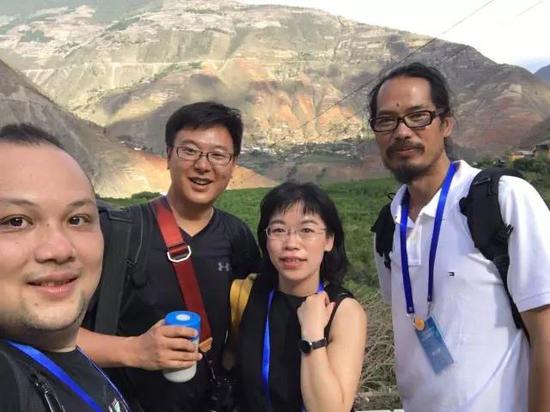
Up to now, Zhukula Coffee has completely preserved the custom of primary processing and drinking of coffee beans, and it is one of the places of inheritance of Chinese coffee culture for a century. In Zhukula village, drinking coffee has become a local drinking custom, just as we drink tea. The traditional folk processing of Zhukula coffee beans mainly includes sun drying, pestle and mortar peeling, iron pot stir-frying, stone milling and making coffee in soil cans, etc. Every family in Zhukula village has coffee. When the coffee is ripe, the villagers pick the coffee fruit, dry it and peel it off; roast the coffee beans with chicken oil or lard in a large iron pot for cooking; then grind them into coffee powder with ground stone, then wrap it in a piece of coarse white gauze and wrap it with a few tablespoons of coffee powder. Then fill the teapot with fresh water, boil it on a tripod in the fire pond, throw in the gauze ball wrapped in coffee powder, stir constantly with a small spoon, and after a while, take out the gauze ball, and the coffee is made. If a guest comes from afar, the host will invite the guest to drink such a rich and mellow cup of homemade coffee.
Characteristics of world cultural heritage
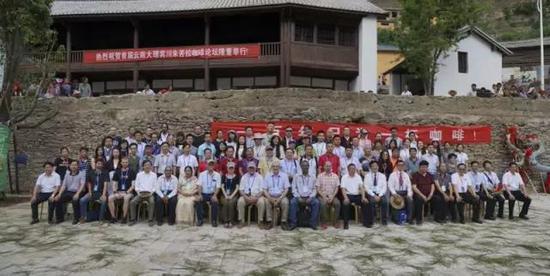
The simple historical characteristics, distinct cultural characteristics and eternal national symbol of Zhukula ancient coffee forest in Binchuan, Yunnan, are highly unified in human history, religious background, economy and ecology. The ancient coffee forest in Zhukula Village is the most classic epitome of agricultural production following the slash-and-burn cultivation of the ancient Yi people in the 2.66 million-hectare dry-hot valley of the Jinsha River in Sichuan, Xizang and Yunnan provinces. To sum up, the century-old coffee forest, Catholic church and religious and cultural background, church schools, century-old custom of drinking coffee in local rural areas, Yi traditional village buildings and the original ecological scenery in the depths of the mountains constitute the common cultural landscape of mankind as a whole, which is referred to in the Convention on the Protection of World Cultural and Natural Heritage. It has high historical and cultural value and eternal protection significance, and has the characteristics of world cultural heritage.
The significance of the forum
Through the holding of the Zhukula Coffee Forum, to carry forward and enhance the historical and cultural role and popularity of Binchuan County and Zhukula Village at home and abroad, promote the development of Binchuan tourism and local investment, and fully tap the Zhukula coffee culture. promote the protection and inheritance of the agricultural cultural heritage; introduce technology and funds to promote the development of coffee tourism industry It will play an extensive and far-reaching role and significance in adjusting the industrial structure of Binchuan, promoting accurate poverty alleviation, increasing the income of farmers, promoting social civilization and progress in Binchuan, and promoting stability and unity in ethnic minority areas.
Give full play to the advantages of the forum, promote industry-university-research cooperation, and provide technical support for the sustained, healthy and stable development of Zhukula coffee culture industry. Properly handle the relationship between development and protection, change the mode of industrial development, and vigorously promote the development of Zhukula coffee culture tourism industry. We will pay attention to market cultivation, implement industrial precision poverty alleviation, promote transformation and upgrading from the international market to both the international market and the domestic market, and increase the income of the poor. Mobilize the resources and efforts of all parties to jointly promote the protection of Zhukulagu coffee forest in Binchuan and the characteristic rural tourism industry.
Zhukula Village, Binchuan County, Yunnan Province, a paradise far away from the hustle and bustle of the city, how to protect and develop this undeveloped virgin land is a problem worthy of our deep study. The century-old coffee forest and Zhukula villagers have been in harmony with the environment for more than a century, proving the diversity of agricultural organisms in Zhukula village. The primary problems in our work are: (1) how to protect the traditional village of this ethnic minority and the only remaining century-old coffee forest in China and its closely related historical relics; (2) how to develop the tourism industry based on Yi slash-and-burn farming and century-old coffee history and culture. (3) how to put an end to the occurrence of various events that destroy the natural ecology and save the world cultural heritage of Zhukula village.
Facing history squarely, cherishing history and summing up history is not only for inheritance, but also for innovation based on accumulated strength. The century-old coffee tree and its descendants are still there. In this mysterious and easily forgotten Yi village, in the rare corner of the mountain, it is written in that poem: my old friend has gone by Baiyun, and Yi Township leaves the church building empty. Coffee red dyed Zhu Kula, remember bitter sweet fragrance for a hundred years.
Important Notice :
前街咖啡 FrontStreet Coffee has moved to new addredd:
FrontStreet Coffee Address: 315,Donghua East Road,GuangZhou
Tel:020 38364473
- Prev
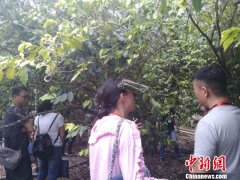
Coffee experts from all over the world focus on the protection and inheritance of ancient coffee forests
Professional barista exchanges, please pay attention to coffee workshop (Weixin Official Accounts cafe_style ) The first Yunnan Binchuan Zhukula Coffee Forum was held in Zhukula Village on the 17th. Coffee experts from the United States, France, India and Ethiopia focus on the inheritance and protection of the Jukura coffee forest and coffee culture and intangible cultural heritage, as well as the scientific development of the cultural brand of Jukura coffee. bin
- Next

Chinese people like coffee more and more.
Professional baristas please follow the coffee workshop (Wechat official account cafe_style) picture / Danilo De Cicco whether it is fashionable or fond of, the consumption of coffee in China continues to rise to have a cup of coffee? Oh, I need a cup of coffee. In Italy, who would refuse that small cup of delicious coffee? It's not a simple habit, it's a real one.
Related
- The ceremony is full! Starbucks starts to cut the ribbon at a complimentary coffee station?!
- A whole Michelin meal?! Lucky launches the new "Small Butter Apple Crispy Latte"
- Three tips for adjusting espresso on rainy days! Quickly find the right water temperature, powder, and grinding ratio for espresso!
- How much hot water does it take to brew hanging ear coffee? How does it taste best? Can hot water from the water dispenser be used to make ear drip coffee?
- What grade does Jamaica Blue Mountain No. 1 coffee belong to and how to drink it better? What is the highest grade of Blue Mountain coffee for coffee aristocrats?
- What are the flavor characteristics of the world-famous coffee Blue Mountain No. 1 Golden Mantelin? What are the characteristics of deep-roasted bitter coffee?
- Can I make coffee a second time in an Italian hand-brewed mocha pot? Why can't coffee be brewed several times like tea leaves?
- Hand-brewed coffee flows with a knife and a tornado. How to brew it? What is the proportion of grinding water and water temperature divided into?
- What is the difference between Indonesian Sumatra Mantinin coffee and gold Mantinin? How to distinguish between real and fake golden Mantelin coffee?
- What does bypass mean in coffee? Why can hand-brewed coffee and water make it better?

